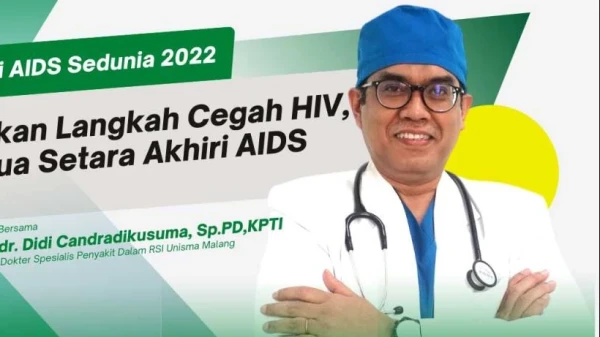Malang, NU Online East Java
World AIDS Day (HAS) was first observed on December 1, 1988. During HAS, people around the world show support for those living with HIV, as well as remembering those who they lost their lives to AIDS.
HAS Commemoration in Indonesia aims to increase community knowledge, awareness and independence, especially of women and youth, in HIV-AIDS prevention and control through the mobilization of resources involving all related sectors .
It is hoped that the 2022 HAS commemoration runs smoothly and achieves its intended goals with the involvement of all stakeholders, as a concrete step towards realizing equality in achieving Ending AIDS by 2030. Let’s join steps to prevent AIDS ‘HIV, because all are equal to end AIDS.
HIV infection is still a global and national health problem. HIV cases in the Southeast Asia region account for 10% of the total HIV burden worldwide. In Indonesia, HIV prevalence in most areas is 0.26%, while in Papua and West Papua it is 1.8%.
Over the past 20 years there has been progress in the fight against HIV-AIDS in the world, including Indonesia. Globally, the HIV epidemic has decreased by about 33% since 2001, so that in 2012 there will be an estimated 2.3 million new infections among adults and children.
AIDS-related deaths have decreased 30% since 2005 due to increased access to ARV treatment, including TB-related deaths, which have also decreased 30% since 2004. AIDS-related deaths have decreased from peak from 2004 with 1.7 million AIDS-related deaths per year to 770,000 AIDS-related deaths in 2016.
However, it is realized that the reduction of new infections and deaths has not yet reached the expected reduction target. The occurrence of the COVID-19 pandemic since 2020 has significantly slowed efforts to eliminate HIV-AIDS in 2030.
Indeed, in the last 2 years, not much progress has been made in many countries. Indonesia and other countries around the world are working to end AIDS by 2030. Control efforts are being made by implementing strategies for health promotion, prevention, detection and case management, supported by the ongoing healthcare transformation, including strengthening primary care, achieving universal health coverage, and community/community engagement.
The challenge of dealing with HIV-AIDS in Indonesia is quite big. Among other things, prevention efforts are still suboptimal, uptake of antiretroviral treatment is low, there are still perceived inequalities in HIV services, especially for women, children and adolescents, and stigma and discrimination are still felt.
Overcoming these challenges requires the support of all stakeholders, from both central and regional government, academics/professionals, communities, the private sector and the media.



